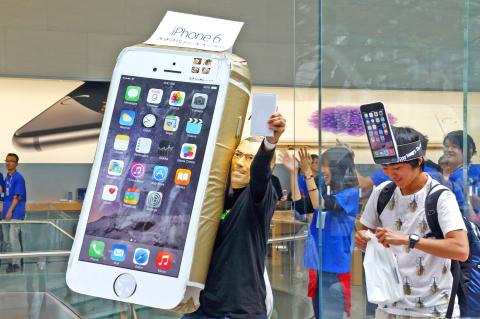Buyers from China, deprived of the latest iPhone launch at home, were yesterday among the first in line in Japan to grab the “6” and its new large-screen cousin as Apple Inc hit back at rivals.
Licensing problems in China meant the global rollout went ahead without the huge and lucrative market, in a blow to Apple, which had trumpeted its inclusion in the initial wave of the last iPhone launch.
Outside Tokyo’s flagship Apple store in glitzy Ginza, dozens of Chinese were among those waiting.

Photo: Bloomberg
“I’m queueing because it’s not sold in China yet,” said Chen Manyan, a 21-year-old tourist from China’s Fujian Province, adding: “It’s expensive, though.”
Zou Zhiyang, 29, a Chinese student studying in Tokyo, said he intended to buy the maximum two handsets allowed.
“I’ll buy one for myself, and another to sell to one of my friends in China,” he said.
On the eve of the launch, Beijing said Apple had won two necessary approvals, one to certify the phone for the Chinese market and another for wireless devices.
“But iPhone 6 still needs to obtain a key network access license before it can enter the Chinese mainland market,” Xinhua news agency said.
The delay has created a lucrative secondary market, especially in Hong Kong, where dealers pay more than the retail price expecting to get even more in turn from mainland buyers.
“If we are talking about the 128-gigabyte version, we would buy it for as much as HK$18,000 [US$2,322],” said Gary Yiu, the manager of the iGeneration reseller store.
That is more than double the price of the top-of-the-range iPhone 6 Plus.
“I have around 200 preorders, with 60 to 70 percent of these from mainland Chinese customers,” Yiu said, adding that he had dispatched 10 staff members to buy as many as possible.
Yiu said the golden version of the 128GB iPhone 6 Plus was the most sought after, and he could resell it for more than HK$20,000.
Dozens of resellers outside Hong Kong’s Apple stores handed over thick wads of cash to people selling their handsets.
The booming reseller market “means Apple products are still in high demand in China... Their products are still highly accepted there,” Hong Kong-based market analyst Jackson Wong (黃志陽) said.
Apple says more than 4 million preorders were received in the 24 hours after the sale was announced.
Both new iPhones have larger screens in what some consider Apple catching up with the “phablet” trend pioneered by competitors. Main rival Samsung Electronics Co has long had a range of larger handsets, which are popular in Asia, and will soon release a new Galaxy Note 4 phablet.
Other markets launching the Apple device yesterday were Singapore, Britain, France, Germany, the US, Canada and Puerto Rico. About 20 more countries, including Taiwan, are to get the new iPhone from Friday.

The Eurovision Song Contest has seen a surge in punter interest at the bookmakers, becoming a major betting event, experts said ahead of last night’s giant glamfest in Basel. “Eurovision has quietly become one of the biggest betting events of the year,” said Tomi Huttunen, senior manager of the Online Computer Finland (OCS) betting and casino platform. Betting sites have long been used to gauge which way voters might be leaning ahead of the world’s biggest televised live music event. However, bookmakers highlight a huge increase in engagement in recent years — and this year in particular. “We’ve already passed 2023’s total activity and

Nvidia Corp CEO Jensen Huang (黃仁勳) today announced that his company has selected "Beitou Shilin" in Taipei for its new Taiwan office, called Nvidia Constellation, putting an end to months of speculation. Industry sources have said that the tech giant has been eyeing the Beitou Shilin Science Park as the site of its new overseas headquarters, and speculated that the new headquarters would be built on two plots of land designated as "T17" and "T18," which span 3.89 hectares in the park. "I think it's time for us to reveal one of the largest products we've ever built," Huang said near the

China yesterday announced anti-dumping duties as high as 74.9 percent on imports of polyoxymethylene (POM) copolymers, a type of engineering plastic, from Taiwan, the US, the EU and Japan. The Chinese Ministry of Commerce’s findings conclude a probe launched in May last year, shortly after the US sharply increased tariffs on Chinese electric vehicles, computer chips and other imports. POM copolymers can partially replace metals such as copper and zinc, and have various applications, including in auto parts, electronics and medical equipment, the Chinese ministry has said. In January, it said initial investigations had determined that dumping was taking place, and implemented preliminary

Intel Corp yesterday reinforced its determination to strengthen its partnerships with Taiwan’s ecosystem partners including original-electronic-manufacturing (OEM) companies such as Hon Hai Precision Industry Co (鴻海精密) and chipmaker United Microelectronics Corp (UMC, 聯電). “Tonight marks a new beginning. We renew our new partnership with Taiwan ecosystem,” Intel new chief executive officer Tan Lip-bu (陳立武) said at a dinner with representatives from the company’s local partners, celebrating the 40th anniversary of the US chip giant’s presence in Taiwan. Tan took the reins at Intel six weeks ago aiming to reform the chipmaker and revive its past glory. This is the first time Tan